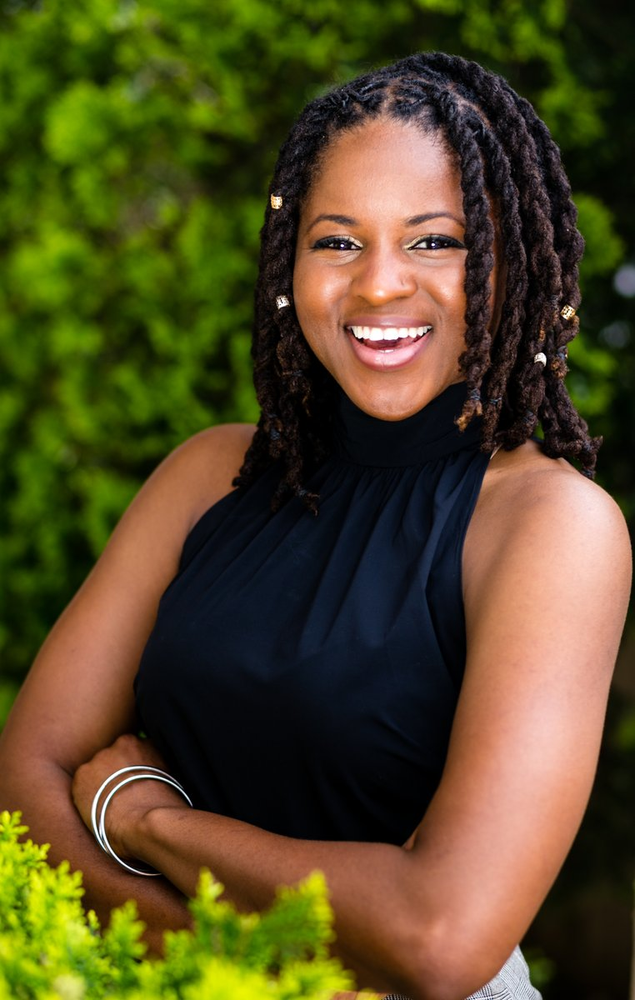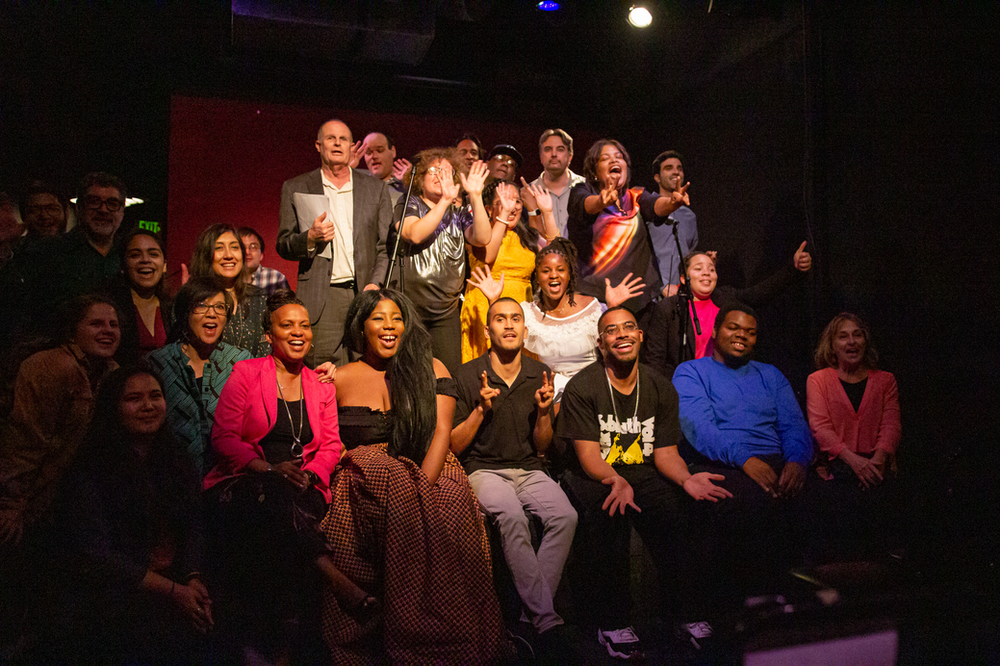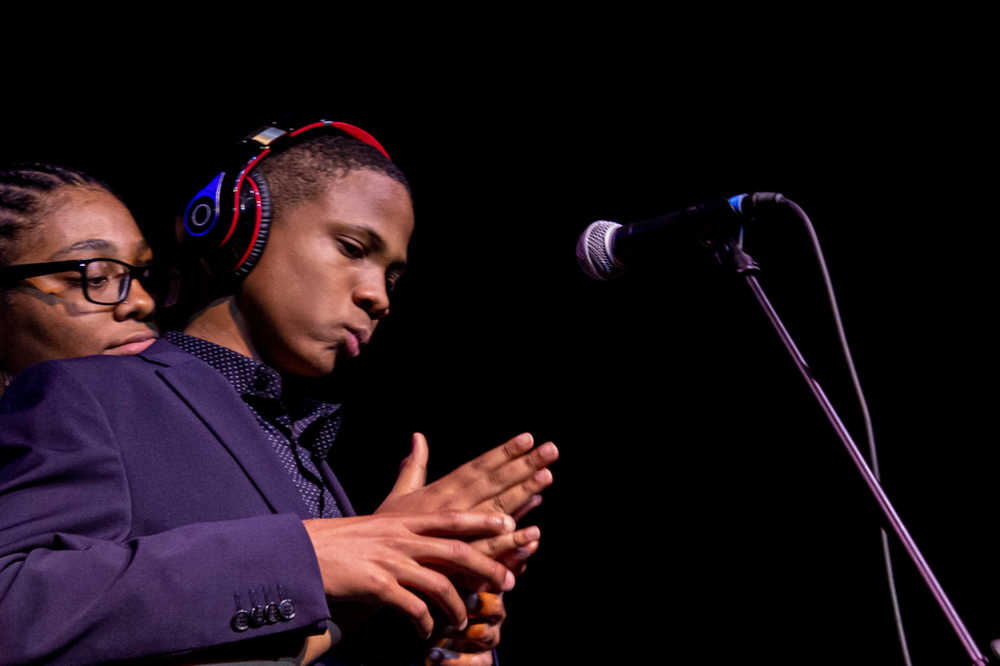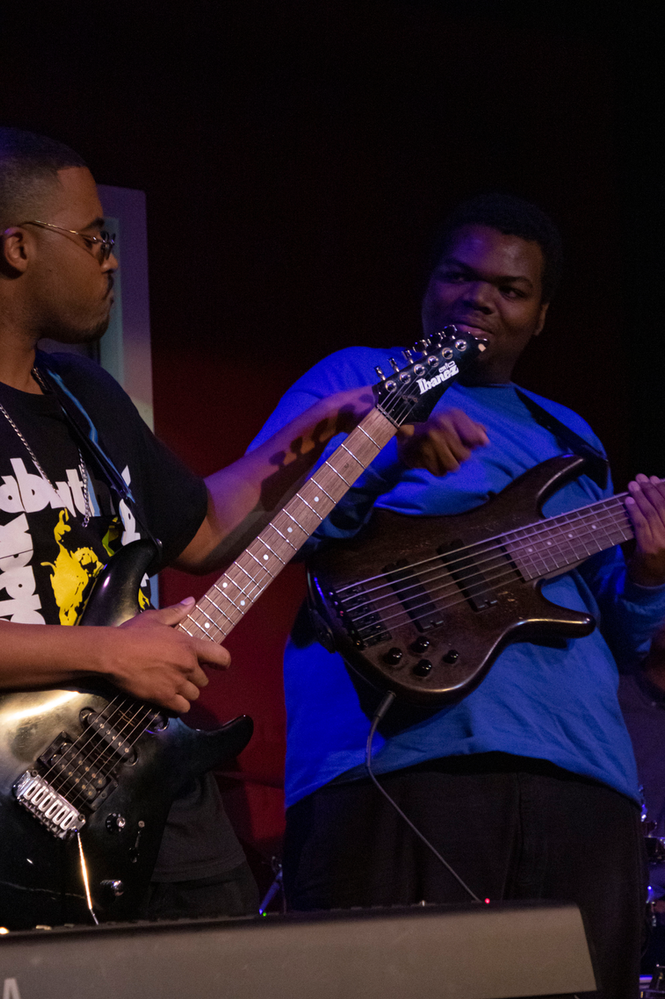Jazz Hands For Autism was established in 2014 by Founder and Executive Director, Ifunanya Nweke who was inspired after an encounter she had with a student named Ruben, a young musician on the autism spectrum.
Ifunanya was born in Nigeria and immigrated to the United States at the age of twelve. Her introduction to the autism community happened when she was a sophomore in college and volunteering for a program at UCLA that supported children with autism. She felt very connected to the community and following that experience kept looking for opportunities to work with people with autism. After coming across a vocal coach and piano teacher position she figured that being a vocalist who taught herself to play the piano, she could teach beginners. That was her first work that combined autism and music.

Photo: Ifunanya Nweke, Founder and Executive Director of Jazz Hands For Autism
She became a behavioral interventionist working in the schools and homes of different people who had autism whether it was individually or in a group setting. One day she was tasked with shadowing another behavioral interventionist on a day he happened to have a client who was a musician, a seventh grade student named Ruben. Her assignment was to follow Ruben into all of his classes. His music class happened to have a substitute teacher that day and so the the children were free to do whatever they want! Ruben ran to the piano and just began playing magically and had a beautiful singing voice. The other students in the class, who were not on the autism spectrum, began accompanying him by enthusiastically running to the remaining instruments in the room such as the bass, guitar and drums.
Ifunanya witnessed something incredibly special in that moment. They were all following Ruben in that moment as he led them in the music. Ruben was mainstream, meaning he was one of the few in his class that was on the autism spectrum. Most of his time was spent separated from his classmates but in his music classes he was expressing himself authentically.
“What I saw that day was when someone is sitting in their wheelhouse, in their strengths, they can communicate and build community. That is the foundation upon which Jazz Hands was founded. Our musicians are not just recipients of services, they are builders of community,” Ifunany told Amplify Africa.

Ifunanya knew that just like Ruben, there must be many more musicians in the world with autism whose potential would remain dormant unless cultivated in intentional ways. Jazz Hands For Autism is creating pathways to employment for musicians on the autism spectrum.
Jazz Hands primarily support adults who have autism by providing training which helps them deepen their musical abilities, gain social and professional skills, and ultimately find work in the community, whether it’s performing or teaching music to other students specifically with disabilities essentially paying it forward. Whether they want to work in a studio, be a recording artist, or a composer, Jazz Hands works to connect them and help find placement for their music.
“A lot of people don’t understand autism even though it’s so prevalent. As of 2018, one in 56 people in America have autism and that number is growing annually. Too many people still don’t understand exactly what autism is and can be intimidated by it or even apprehensive. That also comes up when it’s time for us to find work placements for our musicians. The conversation changes once we mention autism even though they could be very talented and qualified for the role,” Ifunanya shared.
Three Minutes With Ifu
Ifunanya just launched an interview series titled “Three Minutes With Ifu,” where she holds discussions about how we can continue to break barriers and advocate for the abilities and talents of people with autism. When speaking about the concept of the show, Ifunanya said, “since we are working in the music industry, we wanted to get in touch with people in the industry and see what they already have going on as it relates to neurodiversity. If they don’t have anything, then we can have a conversation to help them understand that there may be a lot of people with autism who already use their products so that’s a market they may want to look into, or we could reach out to other entities like the Recording Academy to see how they’re expanding the definition of diversity beyond race, gender and sexual orientation. Neurodiversity is an important facet of diversity because sometimes disability can be a marker of identity.”
https://www.youtube.com/watch?v=Do5L9-09BgQ&list=PLGI_gXgDEufXyeY55s7dPef_doImqtyr9
In the first episode shown above, Ifunanya spoke with Senior Director of Education and Community Engagement at the GRAMMY Museum, Kaitlyn Nader. There are some more great conversations soon to be released with the guitar company Fender, KJLH (102.3 FM) an Urban Adult Contemporary radio station owned by Stevie Wonder that serves the Los Angeles area.
“I’m a fact junkie,” Ifunanya jokes as she explains that each episode opens with facts about autism that correlate with the conversation taking place. In her episode with KJLH which is a Black owned radio station she wanted to share facts that show how there are inequities in the diagnosis of autism and also in accessing resources and services. The purpose of Three Minutes With Ifu is to open up the conversation for people to expand their definition of diversity.

The name Jazz Hands For Autism does not mean they are limited to only jazz artists. In fact, their musicians represent a wide range of genres including abstract funk jazz, pop, gospel, rock and more. The name instead represents the fact that many people with autism do something called stimming when they get excited. This short self-stimulatory behavior includes hand-flapping which can look like jazz hands. Jazz hands is also a move in musical theater done at the end of a production which signifies triumph. So, “the name jazz hands represents the excitement while triumphing over the stigmas that hinder people with autism.”
Autism In Africa
Last April, in honor of Autism Awareness Month, Ifunanya shared 30 days of facts and stats. During her research she discovered there is very little research on autism and neurodiversity in Africa. It is not that there are no people with it, but rather the lack of research there results in rare diagnosis and very little services which is a huge problem. She is currently working on her doctorate degree and and looking to see how she can influence the educational system to make space for people who are neurodiverse to learn and access quality education.
The stigma on the continent associated with people who are neurodiverse is a major reason why no one looks into this. In Nigeria, with a population of 174 million people there are only 130 psychiatrists in the country. These shocking statistics are what drive Ifunanya to eventually provide services to people with autism all over the world and effect change on a global level.
What Can You Do To Help?
“For people with autism to be able to be fully integrated into society, that society needs to first understand and accept autism,” Ifunanya says, “everyone needs to be an advocate for neurodiversity in the same way that we champion different movements like Black Lives Matter and LGBTQ+ movements.” Jazz Hands highlights the importance of these conversations being had about people with disabilities because people with disabilities exist at every single intersectionality.

People should always stop and take a moment to consider ‘how does this affect people with disabilities?’ Jazz Hands is always accepted donations of time, money, referrals and services. There are many ways for volunteers to get involved as Ifunanya shared, “we are unique as an organization as we occupy the sensor of 4 different disciplines; entertainment (music), education (music educational and vocational programs), employment and disability.” This means that people from all of those areas can find volunteer opportunities with Jazz Hands. Music is also a great equalizer so if there are any musicians out there who are looking for collaborators they can reach out to Jazz Hands as their musicians are incredibly talented and more than capable. Finally, you can donate to Jazz Hands as Ifunanya says, “we are limited only by the funding that we have, not by our ideas.”
Jazz Hands is a beautiful representation of how community and confidence are intertwined. Their services help the musicians to build and develop confidence and self efficacy in their abilities which then allows them to confidently share those gifts with their community. Ifunanya shared the Jazz Hands motto that, “confidence is knowing that you have something of value to give to others, and that community thrives when that giving becomes reciprocal.”
Powered by WPeMatico


